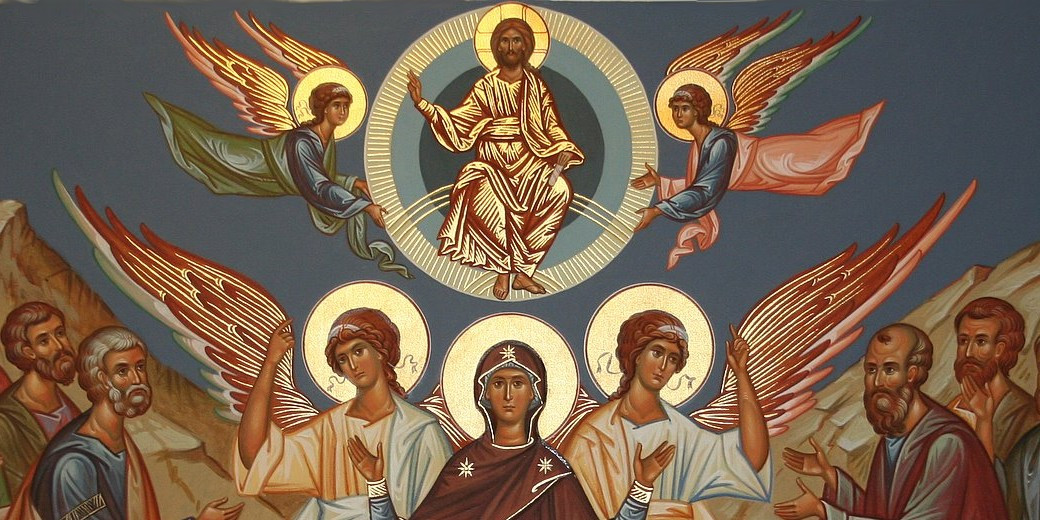
by Fr. Jonathan Cholcher
“Now this, ‘He ascended’ (Ps. 67:19) – what does it mean but that He also first descended into the lower parts of the earth? He who descended is also the One who ascended far above all the heavens, that He might fill all things.” (Ephesians 4:9-10)
The Ascension of Christ necessarily assumes His descent. Christ’s change of place in going up to heaven only happened because He first came down from heaven to earth. But what does this mean, really? Jesus told the Pharisee Nicodemus, one of the rulers of the Jews: “If I have told you earthly things and you do not believe, how will you believe if I tell you heavenly things? No one has ascended to heaven but He who came down from heaven, that is, the Son of Man who is in heaven” (John 3:12-13).
Speaking with Nicodemus face to face in the flesh, Jesus reveals that He “came down from heaven,” yet He is simultaneously “in heaven.” This means that Christ’s descent from heaven was not a physical, or material, change of place, as though the Son of God left heaven and was now located only on the earth. This means that Christ’s descent from heaven was a condescension, a change of place of honor, or status.
The pre-eternal, only-begotten Son of God – all-powerful God by nature – lowered Himself to the level of us creatures and became man. As the Apostle Paul writes elsewhere: “Christ Jesus, being in the form of God emptied Himself, taking the form of a slave, and coming in the likeness of men. And being found in appearance as a man, He humbled Himself and became obedient to death, even the death of the cross” (Phil. 2:6-8). Not only did the uncreated Son of God become a creature, but He lowered Himself to the level of mortal man, identifying Himself with dishonorable, shameful, and cursed sinners.
The divine nature of the Son of God always remains “in heaven” beyond this created universe. Indeed, because He is God, the heavens of heavens cannot contain the Son of God. Yet “the Word became flesh and dwelt among us” (Jn. 1:14). As we confess with the Platytera (lit., “More Spacious”) Icon of the Theotokos, He whom the heavens cannot contain is found contained within the womb of the Virgin; therefore, she is more spacious than the heavens. The divine Son of God condescended to become a creature, a human being in every way we are human (except without sin; Heb. 4:15). The Ascension of Christ is the translation of our human nature united in His Person to the heavenly realms above and beyond this merely physical and material existence.
Consider this awesome truth again. Our human nature is translated to heaven in the Person of Christ Jesus. The condescension of Christ was the assumption of our nature into His Person. “Condescension” (from the Latin, condescensio) literally denotes a descent “together with us” (Lat., descensio + con). Christ came to be what and where we are in sin and death that we now might be what and where He is in grace and glory. The Apostle Paul writes: “Even when we were dead in trespasses, [God] made us alive together with Christ (by grace you have been saved), and raised us up together, and made us sit together in the heavenly places in Christ Jesus” (Eph. 2:5-6).
In the language of the Latin Fathers of the Church, the word condescension came to be the equivalent of the Greek word economia (lit., “house-management”; usually translated as “stewardship” or “dispensation”). Economia, or condescension, refers to God’s plan of salvation in the Incarnation of the Son of God, His becoming one of us to renew our nature and restore us to His divine life (see Eph. 1:10; 3:2). The economia, or condescension, of the Son of God is completed with His Ascension to the right hand of the Father and the pouring out of the Holy Spirit upon the faithful. Because of Christ’s condescension we are liberated from sin and death to ascend above and beyond this mortal existence, truly to participate in the incorruptible inheritance of the kingdom of heaven.
“If then you were raised with Christ” (in holy Baptism), “seek those things which are above, where Christ is, sitting at the right hand of God” (at His Ascension). “Set your mind on things above, not on things on the earth. For you died” (to sin, in Baptism), “and your life is hidden with Christ in God. When Christ who is our life appears” (at His coming on the Last Day), “then you also will appear with Him in glory” (Col. 3:1-4). You see how the death, resurrection, and ascension of Christ are now woven into our lives through Baptism, faith, and contemplation. In Christ we begin to experience the reality of the glory of God to be fully revealed when this earth passes away.
This is why at the Divine Liturgy the baptized gather around Christ in the Holy Spirit and say, “Blessed is the Kingdom…”; “Let us lift up our hearts. We lift them up unto the Lord”; “Thou hadst brought us up to heaven, and hadst endowed us with Thy Kingdom which is to come”; “Remembering this saving commandment and all those things which have come to pass for us: the Cross, the Tomb, the Resurrection in the third day, the Ascension into heaven, the Sitting at the right hand, and the second and glorious Coming.”
Because of the condescension of Christ, the faithful live in the reality of the Ascension of Christ, simultaneously dwelling on earth and in heaven, especially when gathered for Divine Liturgy at Holy Communion. “But you have come to Mount Zion and to the city of the living God, the heavenly Jerusalem…” (Heb. 12:22). Our Lord Jesus Christ, the Savior, elevates us in Himself from sin to righteousness, from death to life, from dishonor to honor, from earthbound passions to the love of God, from cursed condemnation to the blessedness of the saints.
